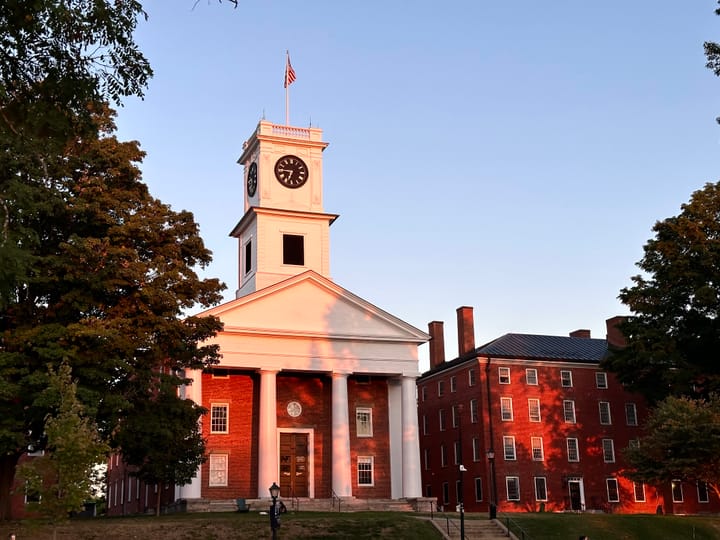Students Rally Support for Prison Moratorium Bill
Alongside students at other Massachusetts colleges, Amherst students are mobilizing to garner support for a Massachusetts state legislature bill that would place a five-year moratorium on prison construction. They are advocating for the funding of community programs instead of prisons.
In a joint effort with students at other Massachusetts colleges, Amherst students are mobilizing for a new bill that would place a five-year moratorium on prison construction and expansion in Massachusetts. Student organizers have rallied support for the bill with a letter to elected officials that has received nearly 200 signatures, in which they argue against the building of new prisons and instead advocate for the funding of community programs.
Co-sponsored by State Senator Joanne Comerford — who represents the Hampshire, Franklin, and Worcester District, including Amherst — the new bill was filed in response to the proposed construction of a $50 million new women’s prison in Norfolk. The new prison was proposed as an “innovative” addition that would focus on “higher standards” for the women there, according to officials at the Department of Corrections (DOC). It has been widely assumed that the prison will replace the older MCI-Framingham facility, a medium-security prison in Framingham. The DOC, however, has communicated that “no final decision has been made to close MCI-Framingham.”
“The current plan for a new women’s prison at Norfolk is not very far along in the process,” Comerford said at a briefing last year. “Blueprints haven’t been drawn up; construction hasn’t begun. So that means that swift passage of this bill could help interrupt construction.”
Critics of the new prison cite Massachusetts’ falling incarceration rates of women as reason to pass the moratorium and halt the prison’s construction. MCI-Framingham currently holds fewer than 200 women, and as of 2020, Massachusetts has the lowest female state imprisonment rate in the country, a number that has been declining consistently since 2010.
“[If] you don’t have many women in jail, there’s no reason to build a new prison,” said Mollie Hartenstein ’23, a student organizer who previously worked with Families for Justice as Healing, an organization led by incarcerated and formerly incarcerated women that works to “end the incarceration of women and girls.” It is also one of the organizations that worked on writing the moratorium bill, alongside the National Council for Incarcerated and Formerly Incarcerated Women and Girls.
Hartenstein and Hibiscus Zhang ’25 have been working as part of a growing coalition of Massachusetts college students dedicated to prison abolition. Hartenstein and Zhang were both approached by friends at Mount Holyoke and Smith Colleges to participate in organizing around the moratorium bill, which Hartenstein calls “a first step” toward abolition. Since then, the two have attended weekly meetings that started out with just Five College students but have expanded to include students at Wellesley College, Emerson College, and Harvard College, as well as other community members throughout Massachusetts.
To encourage legislators to support the bill, Hartenstein wrote an open letter, which will be sent to Comerford and State Representative Mindy Domb (a co-sponsor of the bill), as well as the Joint Committee on State Administration and Regulatory Oversight, and the Joint Committee on the Judiciary. The letter was based on a template from Wellesley, which Hartenstein says is also “going around at Mount Holyoke, Smith, and Hampshire.” Amherst students began publicizing the letter on social media in mid-January, and starting last week, Hartenstein, Zhang, and other students have also been tabling in Valentine Dining Hall and Keefe Campus Center to collect signatures.
“The mission of Amherst College, terras irradient, is to enlighten the world,” the letter begins. “To fulfill that mission we must cultivate communities where education is a priority and knowledge is shared with all … Prisons directly threaten our core values; critical thinking, the sharing of knowledge, freedom of thought, and compassion for all.”
“[In] think[ing] critically about the systems of money, power, and politics that define our country … we have learned that building new prisons will never solve the problems of poverty, inequality, and injustice,” the letter goes on to say. “New buildings will not save this broken system, but they will continue to harm individuals in our communities.”
The letter proposes that Massachusetts reallocate the $50 million into “community-led initiatives” to combat poverty. Hartenstein explained, “$50 million is a lot of money that can help a lot of people who actually need help. Instead, those people generally are being funneled into prisons, because poverty is being criminalized.”
Zhang added, “What is the point in building a new women’s prison if we can pour all that money and energy into building programs that actually support the community and actually address problems that lead to incarceration in the first place?”
Hartenstein pointed to the fact that Families for Justice As Healing already runs many such community-led programs, such as a guaranteed income initiative, youth employment programs, and urban agriculture.
“They’re doing that all themselves,” she said. “Imagine what they could do with $50 million — the ways that we could actually fund our communities.”
Both students said that they have found Amherst students to be excited about the letter and the bill. “If you give people an opportunity, they’re more than willing to take it,” Hartenstein noted.
They also emphasized the specific role of college students in organizing around this issue. “We have a lot of energy and a lot of passion that can be used for momentum,” Zhang said.
“We are a group that people attribute a lot of credit to, just by virtue of being Amherst students, whether we deserve it or not … so they actually listen more to our opinions,” Hartenstein said. “And in this case, where this bill will help hundreds of people and save millions of dollars, and prevent prisons from being built, it is very important for us to use that privilege … We can show that we are going to utilize our social location in a way to help other people.”
Zhang and Hartenstein highlighted mutual aid as a primary alternative to the prison system that students can engage with. Zhang is involved with Pioneer Valley Touch the Sky, a local mutual aid group that fulfills resource requests from people in the community. Zhang is also a part of Collectivize Amherst, “a new student organizing collective dedicated to mutual aid” at the college.
The momentum from the letter is encouraging, the two said, both at Amherst and among college students more broadly. “There are plans to build a statewide coalition of Massachusetts abolitionist organizers who are college students, which is really exciting,” Zhang said. “And I think that building the momentum, beyond whatever happens with the bill, is super important.”
Hartenstein also noted that the moratorium bill’s passing in Massachusetts would be groundbreaking, and would give “political capital” to “abolitionists all across the nation.”
“Other states [will] start to realize they could do it too … this is a really good place for us to start,” Hartenstein said.
The bill, S.2030 in the Senate and H.1905 in the House, is in committee and has a reporting date of April 15.





Comments ()